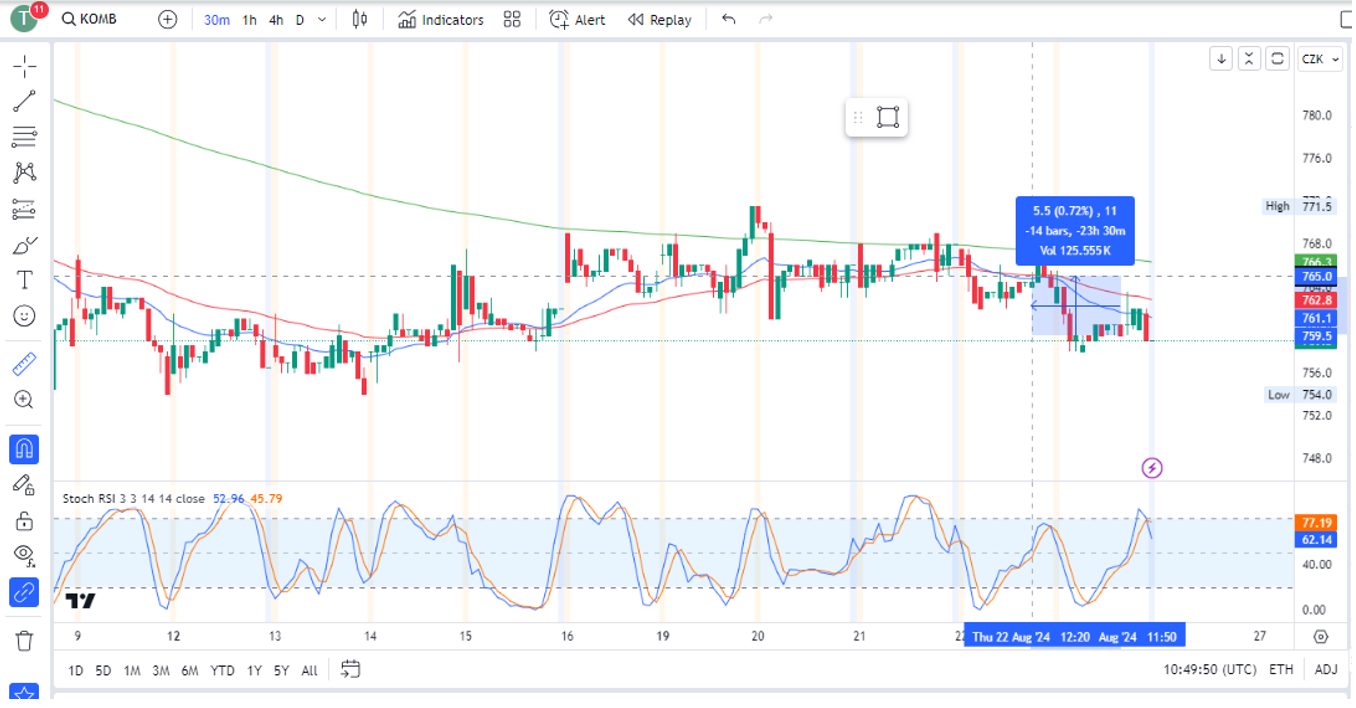Day Trading in the Czech Republic



With a GDP set to grow by 1.2% in 2024 and 2.8% in 2025 according to the European Commission, alongside low levels of public debt and unemployment, the Czech Republic is becoming a magnet for foreign investment.
Featuring a developed economy with increased purchasing power among its population, active trading in Czechia is growing in popularity.
This guide will kickstart your journey to day trading in the Czech Republic.
Quick Introduction
- Czech traders can deal in a huge array of assets, including stocks listed on the Prague Stock Exchange (PSE), currency pairs featuring the Czech koruna (CZK), and commodities given the country’s significant agricultural activities.
- Day trading in the Czech Republic is legal and regulated by the Czech National Bank (CNB) – a “green tier” agency in line with DayTrading.com’s Regulation & Trust Rating.
- Gains from day trading in Czech Republic may be classified as business income and subject to personal income tax. The standard tax rate set by the Financial Administration is 15% and applies to income up to CZK 1,867,728, with a higher rate of 23% on income over this.
Top 4 Brokers in the Czech Republic
Following our latest tests, these 4 platforms are the standout options for day traders in the Czech Republic:
Day Trading Platforms in the Czech Republic
What Is Day Trading?
Day trading is a high-risk approach to online trading where participants aim to profit from short-term market fluctuations. Unlike longer-term trading styles like swing trading and position trading, day traders close all their positions by the end of the trading day.
Czech traders can deal in a wide variety of financial markets, including:
- Stocks, such as those listed on the Prague Stock Exchange (PSE) with equities like Komerční Banka and Moneta Money Bank popular with active traders.
- Indices, such as the PX index, which follows the performance of the largest companies on the PSE and provides a barometer for the wider Czech economy.
- Forex, such as currency pairs containing the Czech koruna (CZK) like USD/CZK and EUR/CZK, featuring significant liquidity and volatility that cater to short-term trading strategies.
- Commodities, such as wheat and corn given that the Czech Republic has substantial agricultural activities, plus platinum and palladium, which feature in catalytic convertors and play a key role in the automotive industry which is significant in Central Europe.
- Cryptocurrencies, such as Bitcoin and Ethereum, are permitted in Czechia though are not regulated in the same way as traditional financial instruments, increasing the level of risk for retail investors.
Is Day Trading Legal In The Czech Republic?
Online trading in the Czech Republic is legal and regulated by the Česká Národní Banka (CNB).
However, there are no specific rules governing day trading activities beyond the European Union’s financial regulations that aim to maintain market integrity, protect investors and prevent money laundering.
Still, brokers should register with the CNB and comply with rules and regulations to protect retail investors like day traders.
Czech residents can also sign up with day trading platforms regulated in other EU member states in line with the passporting scheme, providing a wider choice of firms with extensive market access, competitive fees, fast execution, and first-rate charting tools that short-term typically traders rely on.
How Is Day Trading Taxed In The Czech Republic?
In the Czech Republic, day trading activities typically fall under personal income tax requirements. This means profits can be considered income and hit with a 15% tax.
If your annual income from day trading tops the higher tax threshold (CZK 1,867,728), you’ll need to pay a higher rate of 23% on any additional income.
The tax year in Czechia follows the standard calendar year with returns due to the Financial Administration of the Czech Republic by 1 April the following year or 1 July if you file electronically or use an advisor.
I suggest consulting a tax professional familiar with the latest rules in the Czech Republic who can provide tailored guidance to ensure you meet the requirements and aren’t hit with any fines that could cut into your overall trading returns.
Getting Started
Follow these three steps to start dealing in the financial markets:
- Select a broker. Check the firm is authorized by the CNB or another EU regulator for a secure trading experience. Also consider your needs, for example, access to Czech stocks and CZK forex assets, an intuitive charting platform, education and a demo account if you’re new to trading, and reliable support.
- Open an account. Opening a trading account in the Czech Republic takes less than a few minutes. However, you must pass know your customer checks, verify your identity, and meet anti-money laundering regulations, which may require sending a copy of your ID card (known locally as Občanský průkaz).
- Fund your account. With your account active, it’s time to deposit koruna, taking into account your budget and remembering you could lose any money you invest. Most brokers support deposits by debit card, wire transfer and sometimes digital solutions like Klarna which is popular in the Czech Republic. Also consider a broker with a CZK account for low-cost, convenient deposits and withdrawals to your trading account.
A Day Trade In Action
To show you how it works in practice, here is an example of a Czech stock I day traded: Komercni banka, a Czech Republic-based commercial bank owned by the Societe Generale group.
Analysis
Using Simple Moving Averages and stochastics to do my analysis, with price action stuck in a range on the 30-minute and 1-hour charts and attempting to break out, I waited for the first bearish candle to break through the 20-day moving average before trying to go short.
I targeted an exit at 760.0, an established level that had been tested many times before.

Risk Management
Rule number 1: Always protect your capital. I never risk more than 1% of my balance on any trade and always use a stop-loss order to manage potential losses.
I also always calculate the appropriate position size based on my risk management rules.
Trade Entry
After a period of ranging and a couple of false breakouts, I waited for the first bearish candle to break through the 50-day and 20-day moving averages and close before entering at 765.0.
Using Simple Moving Averages, Stochastic indicators, and reading price action, I entered the trade at the 765.0 level.
Trade Exit
Having set both stop loss and take profit orders before entering the trade, I monitored events closely and paid attention to established levels on the 1-hour, 4-hour, and daily timeframes.
I set a take profit order, allowed my trade to play out as planned, and exited at 765.0.
Bottom Line
In a fast-developing market, day trading in the Czech Republic is legal, regulated, and potentially profitable for skilled traders.
Czech-based traders have access to the established Prague Stock Exchange, alongside financial markets stretching across Europe and further afield.
Still, risk management is essential and only invest koruna you can afford to lose.
To get going, see DayTrading.com’s choice of the top day trading platforms in the Czech Republic.
Recommended Reading
Article Sources
- Česká Národní Banka (CNB)
- Prague Stock Exchange (PSE)
- Financial Administration of Czech Republic
- Day Trading Signals in Czech Republic - Cannon Trading
- Economic Forecast for Czechia - European Commission
- Foreign Exchange Market Information - CNB
- Taxes on Personal Income in Czech Republic - PwC
- Income Determinations in Czech Republic - PwC
The writing and editorial team at DayTrading.com use credible sources to support their work. These include government agencies, white papers, research institutes, and engagement with industry professionals. Content is written free from bias and is fact-checked where appropriate. Learn more about why you can trust DayTrading.com



